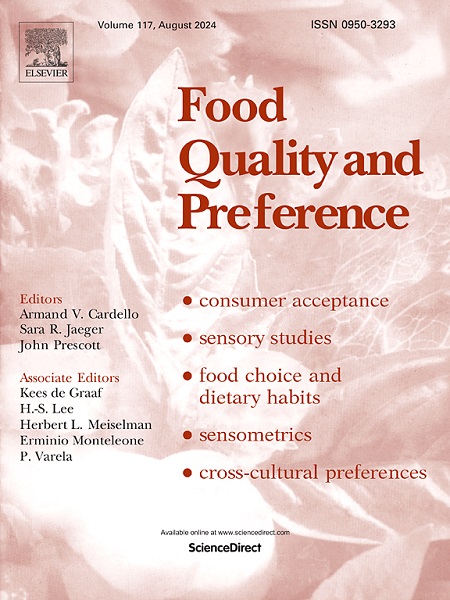Impacts of motherhood on energy intake and macronutrient choice: A comparative study
IF 4.9
1区 农林科学
Q1 FOOD SCIENCE & TECHNOLOGY
引用次数: 0
Abstract
Motherhood is associated with substantial physiological and psychological changes in a women’s life; however, understanding remains limited with regard to eating behavioural related to motherhood. We performed two separate experiments to test potential effects of motherhood on energy intake and macronutrient choice. Experiment I, with a cross-sectional design, compared habitual dietary intake of 116 non-mothers and 107 mothers. This enabled calculations of energy and macronutrient intake. Experiment II evaluated food intake and macronutrient preference of first-time mothers (N = 41) against non-mothers (N = 50), using an ad-libitum intake task and a macronutrient preference ranking task. Consistent across these two experiments, little difference was seen between mothers and non-mothers in terms of the total energy intake. However, the ad-libitum intake task revealed a reduction of carbohydrate intake in mothers (F(4,86) = 3.52, p = 0.010). Furthermore, mothers reported a greater preference for high fat food than non-mothers in the macronutrient preference task (H (1, n = 95) = 7.71, p = 0.005). Overall, results from the study point to potential differences in macronutrient preference and intake related to motherhood. While eating behaviour involves various factors, the present study offers initial insights into this emerging field to inform maternal food-related health initiatives and raises awareness of the importance of studying mothers’ eating behaviours.
母性对能量摄入和常量营养素选择影响的比较研究
母性与妇女生活中的重大生理和心理变化有关;然而,对与母性有关的饮食行为的了解仍然有限。我们进行了两个独立的实验来测试母性对能量摄入和宏量营养素选择的潜在影响。实验一采用横断面设计,比较了116名非母亲和107名母亲的习惯性饮食摄入量。这样就可以计算能量和大量营养素的摄入量。实验二采用随机摄入任务和常量营养素偏好排序任务,评估了首次母亲(N = 41)和非母亲(N = 50)的食物摄入量和常量营养素偏好。与这两个实验一致的是,在总能量摄入方面,母亲和非母亲之间的差异很小。然而,自由摄入任务显示,母亲的碳水化合物摄入量减少(F(4,86) = 3.52, p = 0.010)。此外,在宏量营养素偏好任务中,母亲比非母亲更偏爱高脂肪食物(H (1, n = 95) = 7.71, p = 0.005)。总的来说,研究结果指出了与母亲有关的大量营养素偏好和摄入量的潜在差异。虽然饮食行为涉及多种因素,但本研究为这一新兴领域提供了初步见解,为孕产妇食品相关健康倡议提供信息,并提高了对研究母亲饮食行为重要性的认识。
本文章由计算机程序翻译,如有差异,请以英文原文为准。
求助全文
约1分钟内获得全文
求助全文
来源期刊

Food Quality and Preference
工程技术-食品科技
CiteScore
10.40
自引率
15.10%
发文量
263
审稿时长
38 days
期刊介绍:
Food Quality and Preference is a journal devoted to sensory, consumer and behavioural research in food and non-food products. It publishes original research, critical reviews, and short communications in sensory and consumer science, and sensometrics. In addition, the journal publishes special invited issues on important timely topics and from relevant conferences. These are aimed at bridging the gap between research and application, bringing together authors and readers in consumer and market research, sensory science, sensometrics and sensory evaluation, nutrition and food choice, as well as food research, product development and sensory quality assurance. Submissions to Food Quality and Preference are limited to papers that include some form of human measurement; papers that are limited to physical/chemical measures or the routine application of sensory, consumer or econometric analysis will not be considered unless they specifically make a novel scientific contribution in line with the journal''s coverage as outlined below.
 求助内容:
求助内容: 应助结果提醒方式:
应助结果提醒方式:


